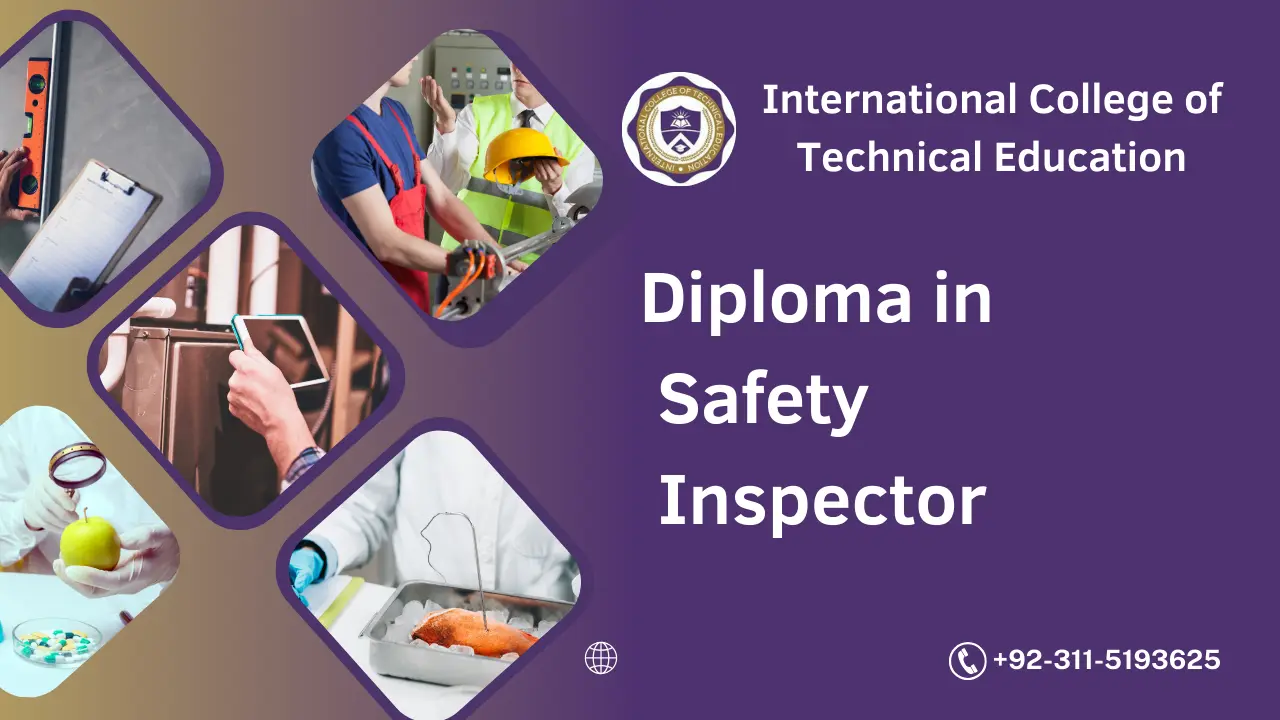In Pakistan, as in any country, ensuring safety in workplaces is paramount. With industries growing and evolving rapidly, the need for qualified safety inspectors has never been greater. Recognizing this demand, educational institutions across Pakistan offer the Diploma in Safety Inspector Course, equipping individuals with the knowledge and skills necessary to safeguard lives and property in various work environments.
Course Introduction
The Diploma in Safety Inspector Course is designed to provide comprehensive training in safety management systems, hazard identification, risk assessment, emergency response planning, and regulatory compliance. It offers a blend of theoretical knowledge and practical skills, preparing students to effectively mitigate workplace hazards and create a culture of safety within organizations.
Course Benefits
- Career Advancement: Graduates of the course have enhanced career prospects in a wide range of industries including construction, manufacturing, healthcare, and transportation.
- Risk Reduction: With in-depth knowledge of safety regulations and best practices, safety inspectors play a crucial role in minimizing workplace accidents and injuries.
- Legal Compliance: Organizations benefit from employing qualified safety inspectors who ensure compliance with local and international safety standards, reducing the risk of legal liabilities.
- Enhanced Reputation: Businesses that prioritize safety gain a reputation for being responsible and caring, which can lead to increased customer trust and loyalty.
Course Study Units
- Occupational Safety and Health Regulations
- Hazard Identification and Risk Assessment
- Safety Management Systems
- Emergency Response Planning
- Workplace Inspections and Audits
- Incident Investigation and Reporting
- Safety Training and Communication
- Environmental Safety and Sustainability
Learning Outcomes
Upon completion of the Diploma in Safety Inspector Course, students can expect to:
- Understand the legal framework governing workplace safety in Pakistan.
- Identify workplace hazards and assess associated risks effectively.
- Develop and implement safety management systems tailored to organizational needs.
- Plan and conduct workplace inspections and audits to ensure compliance with safety standards.
- Respond promptly and effectively to emergencies, minimizing potential harm.
- Investigate incidents thoroughly, identify root causes, and recommend preventive measures.
- Communicate safety policies and procedures clearly to all stakeholders.
- Advocate for environmental sustainability practices in the workplace.
Who Is This Course For?
The Diploma in Safety Inspector Course is suitable for:
- Aspiring safety professionals seeking to enter the field of occupational safety and health.
- Current safety officers or coordinators looking to enhance their knowledge and skills.
- Managers and supervisors responsible for overseeing safety practices within their organizations.
- Individuals passionate about creating safer work environments and protecting lives.
Future Progression for This Course
Graduates of the Diploma in Safety Inspector Course can pursue various career paths, including:
- Safety Inspector/Officer: Conducting safety inspections, implementing safety programs, and ensuring regulatory compliance within organizations.
- Safety Consultant: Providing expert advice on safety best practices, conducting risk assessments, and developing safety management plans for clients across different industries.
- Environmental Health and Safety Manager: Overseeing all aspects of occupational health and safety, including environmental compliance, within large organizations or government agencies.
- Further Education: Graduates may choose to pursue advanced degrees or certifications in specialized areas such as industrial hygiene, ergonomics, or environmental management.
The Diploma in Safety Inspector Course in Pakistan offers a valuable opportunity for individuals to acquire the knowledge, skills, and credentials needed to make meaningful contributions to workplace safety. By investing in such training programs, Pakistan can foster a culture of safety that protects workers and promotes sustainable development across industries.







